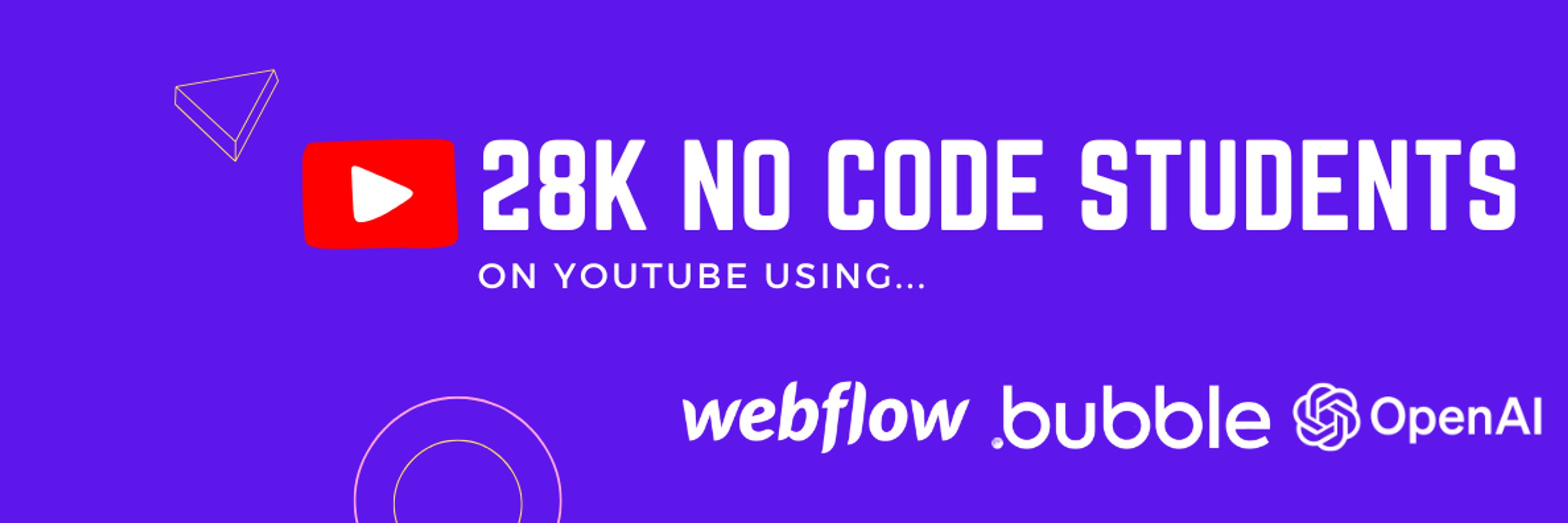
Habitual side project starter 🪴
X @mattblake_uk
Replacing browser alerts with toast notifications and smart redirects makes your Bubble app 10x more professional.
I break down the full setup in my latest tutorial.
https://www.planetnocode.com/bubble-tutorials/user-already-exists-in-bubble-do-this

Replacing browser alerts with toast notifications and smart redirects makes your Bubble app 10x more professional.
I break down the full setup in my latest tutorial.
https://www.planetnocode.com/bubble-tutorials/user-already-exists-in-bubble-do-this
I've used all three in production apps.
Here's what I learned about Context Windows, Follow-up Prompts, and RAG 🧵👇
I've used all three in production apps.
Here's what I learned about Context Windows, Follow-up Prompts, and RAG 🧵👇
Full breakdown: https://www.planetnocode.com/bubble-tutorials/3-ways-save-ai-chat-history-bub
Full breakdown: https://www.planetnocode.com/bubble-tutorials/3-ways-save-ai-chat-history-bub
Watch 👉 https://www.planetnocode.com/bubble-tutorials/web-scraping-made-easy-build-your-own-crawler-in-30-minutes

Watch 👉 https://www.planetnocode.com/bubble-tutorials/web-scraping-made-easy-build-your-own-crawler-in-30-minutes
Scraped HubSpot's blog, filtered for AI content, and displayed results in a custom dashboard.
Watch 👉 https://www.planetnocode.com/bubble-tutorials/web-scraping-made-easy-build-your-own-crawler-in-30-minutes

Scraped HubSpot's blog, filtered for AI content, and displayed results in a custom dashboard.
Watch 👉 https://www.planetnocode.com/bubble-tutorials/web-scraping-made-easy-build-your-own-crawler-in-30-minutes
#AI #GPT5 #OpenAI #SamAltman
#AI #GPT5 #OpenAI #SamAltman
#ChatGPT #AI #ArtificialIntelligence #LLM
#ChatGPT #AI #ArtificialIntelligence #LLM
They're actually confabulations - the same thing humans do when we construct false memories we genuinely believe. Maybe we're not as different from AI as we think.
#AI #ChatGPT #GeoffreyHinton #Psychology #Memory #Confabulation
They're actually confabulations - the same thing humans do when we construct false memories we genuinely believe. Maybe we're not as different from AI as we think.
#AI #ChatGPT #GeoffreyHinton #Psychology #Memory #Confabulation
While AI offers judgment-free advice and endless patience, it can't replicate the vulnerable, messy reality of human bonding. Do real connections require navigating conflict, rejection, and genuine vulnerability?
While AI offers judgment-free advice and endless patience, it can't replicate the vulnerable, messy reality of human bonding. Do real connections require navigating conflict, rejection, and genuine vulnerability?
New research reviewed 16 studies and found something fascinating about AI coaching.
In controlled trials with university students, AI coaches matched human performance for hitting specific, well-defined goals.
New research reviewed 16 studies and found something fascinating about AI coaching.
In controlled trials with university students, AI coaches matched human performance for hitting specific, well-defined goals.
He calls them confabulations.
The same false memories humans create to fill gaps in knowledge - plausible content we genuinely believe is true.
What if AI "hallucinations" are actually proof AI thinks more like us than we want to admit?
He calls them confabulations.
The same false memories humans create to fill gaps in knowledge - plausible content we genuinely believe is true.
What if AI "hallucinations" are actually proof AI thinks more like us than we want to admit?
#TamagotchiEffect #AICompanions #EvolutionaryPsychology #HumanAttachment #DigitalRelationships
#TamagotchiEffect #AICompanions #EvolutionaryPsychology #HumanAttachment #DigitalRelationships
Geoffrey Hinton, the deep learning pioneer, doesn't even call them hallucinations.
He calls them confabulations.
Geoffrey Hinton, the deep learning pioneer, doesn't even call them hallucinations.
He calls them confabulations.
Centaur was trained on 10 million choices from 60,000 people and can now simulate human behaviour in gambling, memory tasks, problem-solving - even in experiments it's never seen before.
Centaur was trained on 10 million choices from 60,000 people and can now simulate human behaviour in gambling, memory tasks, problem-solving - even in experiments it's never seen before.
Explore the ethical dilemmas as AI therapists, doctors, and teachers might become the smarter choice.
#AISafety #FutureTech #EthicalAI #SelfDrivingCars #AIRevolution
Explore the ethical dilemmas as AI therapists, doctors, and teachers might become the smarter choice.
#AISafety #FutureTech #EthicalAI #SelfDrivingCars #AIRevolution
They've created an AI called Centaur that can predict human decisions across hundreds of different psychological tasks with startling accuracy.
They've created an AI called Centaur that can predict human decisions across hundreds of different psychological tasks with startling accuracy.
Back in the 1980s, Anguilla got assigned the .ai domain name by pure chance. Fast forward to today's AI boom and companies are paying MASSIVE amounts for these web addresses.
Back in the 1980s, Anguilla got assigned the .ai domain name by pure chance. Fast forward to today's AI boom and companies are paying MASSIVE amounts for these web addresses.
#AI #psychology #research #science
#AI #psychology #research #science
Researchers identified 4 distinct types of AI anxiety:
- Learning anxiety (constant adaptation)
- Job replacement fears
- Sociotechnical blindness (societal impact confusion)
- Configuration anxiety (not understanding how it works)
Researchers identified 4 distinct types of AI anxiety:
- Learning anxiety (constant adaptation)
- Job replacement fears
- Sociotechnical blindness (societal impact confusion)
- Configuration anxiety (not understanding how it works)
We construct them when needed, filling gaps with what seems plausible.
If both humans and AI construct rather than retrieve information, maybe intelligence isn't what separates us.
Maybe we're just better at catching ourselves making things up.
We construct them when needed, filling gaps with what seems plausible.
If both humans and AI construct rather than retrieve information, maybe intelligence isn't what separates us.
Maybe we're just better at catching ourselves making things up.

